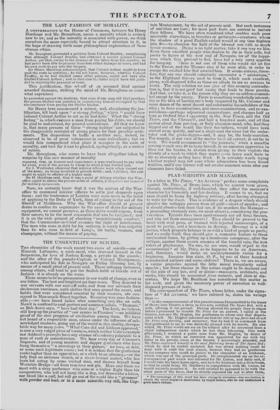THE UNGENTILITY OF SUICIDE.
THE chronicles of the week record two cases of suicide—one of Hannah Lattimore, a cook-maid, who drowned herself in t he Serpentine, for love of Joshua Kemp, a private in the guards ; and the other of the pseudo-Captain or Colonel Montgomery, who anticipated his fate in Newgate on Friday Morning last, by means of a small phial of prussic acid. These unhappy instances, among others, will tend to put the foolish habit of suicide out of fashion : it is already on the wane.
There seems to be no permanence in our world of change, even in our follies. The best and brightest get time-worn. They descend to our servants with our cast-off suits, and from our servants their declension continues, until clothes that once graced the court, and habits that were considered essential by their wearers, are con- signed to Monmouth Street together. Swearing was once fashion- able ;—we have heard ladies utter something very like an oath. Now it is confined to coal-porters and common sailors. " Damnns," as Bob Acres says, "have had their day." The Irish, we believe, still keep up the practice of "our armies in Flanders"—an infallible proof of the slow progress of civilisation among them. We have not heard of a respectable man, unless under the influence of ack- nowledged madness, going out of the world in this shabby, disrepu- table way for many years. "What Cato did and Addison approved," is now a very vulgar piece of business, which neither Cato's example nor Addison's precepts have any chance of rendering palatable to a man of rank or consideration. We hear every day of Coroner's Inquests, and of young maidens and dapper gentlemen who have hung themselves "a mornings in their garters," for love, or debt, or some such legitimate cause ; but it is seldom that the gentleman ranks higher than an apprentice, or a clerk to an attorney,—or the lady than an alehouse wench, or a straw-bonnet maker, who has been led astray by some wicked man, and throws herself from Waterloo Bridge—all from true love and gin. Here and there we meet with a stray performer who aims at a higher flight than his companions, who will not hang like a dog, nor drown like a kitten, nor bleed like a calf, but will go out of the world like a " gemman" with powder and lead, or in a more scientific way still, like Cap- tain Montgomery, by the aid of prussic acid. But such instances of ambition are rare ; for most part fools are content to imitate their fellows. We have often wondered what enables such poor miserable starvelings, in breeches or petticoats—creatures whom the shadow of a good English cudgel would at any time frighten into fits—to abandon the light of the blessed sun with so much heroic seeming. Dying is no light matter, take it any way we like. Even those excellent people who disdain to die in their cells, but prefer to figure at the west end of Newgate, for all the happi- ness which they pretend to feel, have but a very sorry appetite for hanging. 'I here is not one of them who would not set fire to the Tower, and the Thames also if he were able, in order to escape the exalted fate that awaited him. It seems curious, there- fore, that any one should voluntarily encounter a " misfortune," as the Highland thieves used to term it, which such excellent, pious, well-disposed folks as those we allude to are so anxious to avoid. The only solution we can give of this seeming contradic- tion is, that it is not grief but vanity that leads to these pranks. And that, we take it, is the reason why they are so seldom commit- ted except by the young. There is something wonderfully interest- ing in the idea of having one's body inspected by Mr. Coroner and some dozen of the most decent and substantial householders of the alley ; to have examinations, and cross-examinations, and re-exa- minations—perhaps adjourned examinations, and charges half as long as Oxford Street appearing in the New Times, and the Old Times, and the Chronicle, and half a hundred more, and all this pother about Jem pot-boy, or Sally chamber-maid, who, had they slipped out of the world like their forefathers, would have been stowed away quietly, and not a single soul the wiser but the under- taker and the grave-digger—and, it may be, the body-snatcher. The remedy, if our view of the matter be at all correct, is not far to seek. We would recommend to "the journals," when a maudlin serving-wench sees fit to hang herself, or an amorous apprentice to blow out his brains, to abstain from giving to their exploits the eternity of a week to which they aspire ;—to leave such fools to die as obscurely as they have lived. It is certainly worth trying whether neglect may not cure where admonition has been found fruitless, and if our silence will not awake common sense after our clamours have failed.
























 Previous page
Previous page